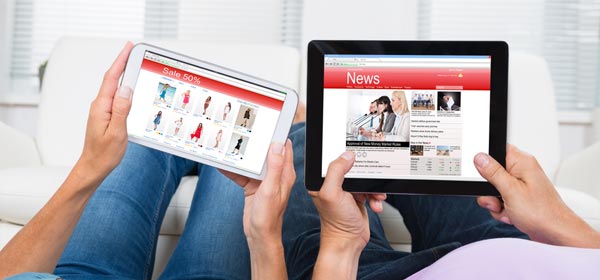Since they first became widely available, tablets have been extremely popular because of their portability and convenience. They have been marked as easy replacements for busy people on the go, and justifiably so. Tablets are easy to use, lightweight and can be used for many purposes, including internet, word processing and entertainment. But for all their hype, are tablets really a better option than the sturdy, traditional laptop? Laptops, in their own right, can be lightweight and convenient. So how do you know if a tablet is better for you? To find out, ask yourself these questions.
1. What will be easier for you to use?
The most obvious difference between a tablet and a computer is the lack of a keyboard. Tablets contain a touchpad interface for all input. For people who have trouble pointing, tapping and dragging to navigate around a program from a virtual keyboard, this can cause frustration. Luckily, this problem can mostly be remedied with the purchase of a tablet keyboard, which can be easily attached and removed from the device. Still, this will be an added expense and Bluetooth keyboards can sometimes experience glitches – so, this is something to consider.
2. How portable do you need it to be?
Size is perhaps the main reason people opt for a tablet over a laptop. Most tablets are about the size of a medium notepad and weigh, on average, around 800g. Many laptops, on the other hand, tend to weigh around 2kg. The reason tablets can be so lightweight is because they don’t require a lot of the hardware (such as the keyboard, trackpad and cooling components) that a laptop needs to function.
3. How long do you need the battery to last?
Tablets are great for power efficiency because they are designed for low power use over long periods. In fact, you’ll find that many newer tablets available today can run for up to ten hours on a single charge. Most of the interior of a tablet is actually taken up by the battery, while the inside of a laptop contains more powerful hardware and a smaller battery. Most laptops will need to be recharged every four to five hours or so, but the latest models are getting close to the eight-hour mark.
4. How much do you want to pay?
The answer to this depends on which types of tablets and laptops you are comparing. There are a few tiers of tablets available on the market, ranging from budget models, starting at around $100, to midrange models around the $300 – 600 mark, and ending with the high-end models, such as the Apple iPad Pro, which costs just under $1000. A decent quality laptop can set you can back around the same as a midrange tablet. By the time you hit the $1000 mark, tablets do tend to start falling behind what similarly priced laptops can achieve. Laptops, in general, are more competitive in terms of pricing than tablets, so you’re likely to get a better laptop at a lower price than a tablet.
The bottom line
The main reason for choosing between a tablet and a laptop is flexibility in mobile computing. Laptops may not have the completeness of portability that tablets offer but they still provide some functions that make them preferable for some people. Some issues, such as storage capacity (for videos, photos and data) and software usage (for particular programs you want to use) should also be considered. The bottom line is making a complete switch to a tablet might be a little much for those who want their computer to provide multiple functions. Until you’re ready to make the switch one way or the other, you might want to try using both.
Related articles:
Reasons to switch to a smartphone
Give your smartphone a second life
How to stay tech savvy

